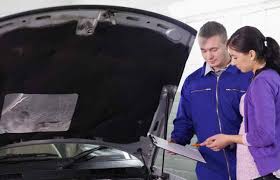What are the most common auto repairs?
Knowing the facts regarding car repairs can be important, especially when considering the cost of your own repairs. If you’re like us, we’re curious about what problems are most common, and how much those common repairs normally cost. Let’s take a look at the top 10 most common repairs.
Oil/oil filter change
Changing the oil filter tops off the list of most common vehicle repairs of 2017. The reason is simple: you’re supposed to change your oil frequently! According to YourMechanic, an industry leader in automotive maintenance and repair estimates, you should be replacing your vehicle’s oil and oil filter about every 7,500 miles. Doing so ensures the mechanisms under the hood continue to function smoothly and properly. Moreover, changing your car’s oil and oil filter will help keep engine components cool, promote better fuel efficiency, and improve your car’s longevity.
Wiper blades replacement
Mechanics’ consensus around wiper blades is that they should be replaced every six months for safety reasons. What happens over the course of a year is that—due to snow, ice, rain, and even sun—the rubber compound that makes up the blade cracks and breaks, causing impaired visibility in the windshield with more and more wiper use. Replacing the blades allows for a cleaner and more comprehensive “wipe” of debris, rain, and snow when you drive, promoting enhanced windshield visibility and therefore safety.

The Loose Fuel Cap
Now, this may feel silly. A loose fuel cap isn’t even a guaranteed problem, so why is it on the list? Because almost half the time a check engine light comes on, it is only a loose fuel cap. This is even more true in new cars. If you are uncertain of where the fuel cap is or how to tell if it is tight enough, then you may want to double-check with a mechanic. This can add a bit of expense, but it will be a lot less than an actual problem. If there is an actual problem, checking early may prevent it from being too big of an issue. Preventative measures are always good.
Replacing Air Filters
On a more serious note, air filters can be a simple but hazardous repair case. The air filter keeps your engine running with a balanced air to fuel ratio. Without this, your engine can misfire. This can damage all sorts of areas in your car, turning a single moment into a chain reaction of damage. Regular checks on your air filter can help to spot when it needs a replacement. Contaminated air filters can be a moderate expense, but ignoring them can be a major one.

Oxygen Sensor Replacements
Replacing an oxygen sensor is an extremely common repair in older cars. Your oxygen sensor is a vital component of your exhaust system which detects uncombusted oxygen in your exhaust. As your car ages, your oxygen sensor becomes worn, and is often due for replacement after 100,000 to 150,000 kilometers of use. A moderately expensive repair, oxygen sensors average around $250 to be replaced.
Catalytic Converter Replacements
As another component of your exhaust system, your catalytic converter neutralize hazardous compounds in your exhaust such as carbon monoxide. As a result, they also increase gas mileage and performance. Catalytic converters are designed to last the entire lifetime of your car, however, unattended repair issues in other components of the exhaust system can cause wear and breakdown to the catalytic converter. New catalytic converters runs consumers $1,150 on average (yikes). While aftermarket catalytic converters are a cost-saving option, most owners rely on original manufacturers to receive standardized and trustworthy parts.
Ignition Coil and Spark Plug Replacements (Both Together)
Ignition coils and spark plugs are another repair that is common on older cars. Your spark plugs send sparks to your ignition chamber, which allow the fuel to ignite and drive your engine. Failing spark plugs can have several distinct signs, which can help you diagnose this problem. The average costs for both of these repairs together is $390.17, but can cause much more expensive damage if not treated properly. Like with all problems, we recommend to have a licensed mechanic inspect your car at the first sign of trouble – it could save you thousands!

Brake work
We all know why brake work is important, especially because one quarter of all Canadian car accidents are caused by a failure to stop. Repairs can take the form of replacing brake pads, which naturally wear down as you use them, and aren’t too costly to fix. This type of repair may also cover brake lines, disc, drum and rotor repair.
Tire repairs and changes
Without good, inflated tires, you loose speed, control, and fuel efficiency, hence the need to get them patched if there’s a leak (for example, if you run over a nail), or replaced if they’re too worn. Better to replace them than risk a blowout on the road, which could lead to a major accident. It’s so important that an auto mechanic, you’ll be trained to notice tire issues when a customer comes in for other matters, to address the problem before it starts.
Battery Replacement
The battery is often what people consider when they think of major routine expenses for your car. It shouldn’t be frequent, but dealing with battery repair will often come in a car’s lifetime and it isn’t the cheapest fix. While batteries cannot last forever, there are a few ways you can keep it healthy as long as you can. When you can’t control all the ways your car may break down, it is nice to take a few measures to help prevent other damages.
Antifreeze/engine coolant flush (radiator flush)
Antifreeze, also known as engine coolant, is a liquid located in the coolant reservoir under your car’s hood. Its function is to prevent the engine’s cooling system from freezing or overheating, depending on the climate, making it a vital component in your car’s health. While there’s no universal mileage threshold for antifreeze replacement, you can expect to flush and replace your engine coolant every 30,000 to 50,000 miles. This is because engine coolant, as with all other liquids/fluids your car needs to run smoothly, deteriorates over time. In this case, coolant can gradually become more acidic and lose some of its rust-inhibiting properties, causing corrosion from within. Corrosion can be detrimental to your car’s radiator, water pump, thermostat, and other components of the cooling system. For that reason, don’t overlook the coolant/antifreeze and have your mechanic check its health when you go in for scheduled maintenance.